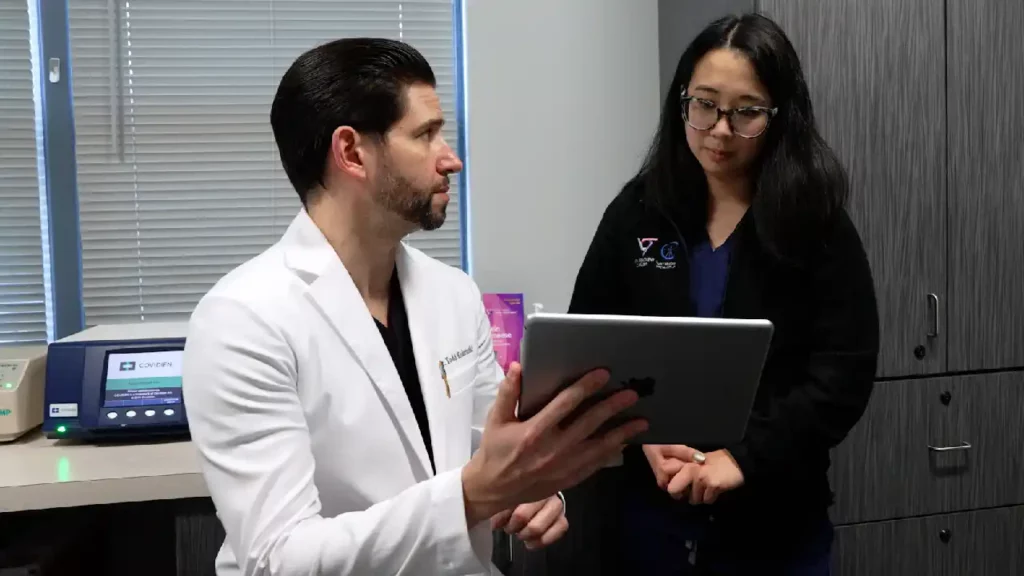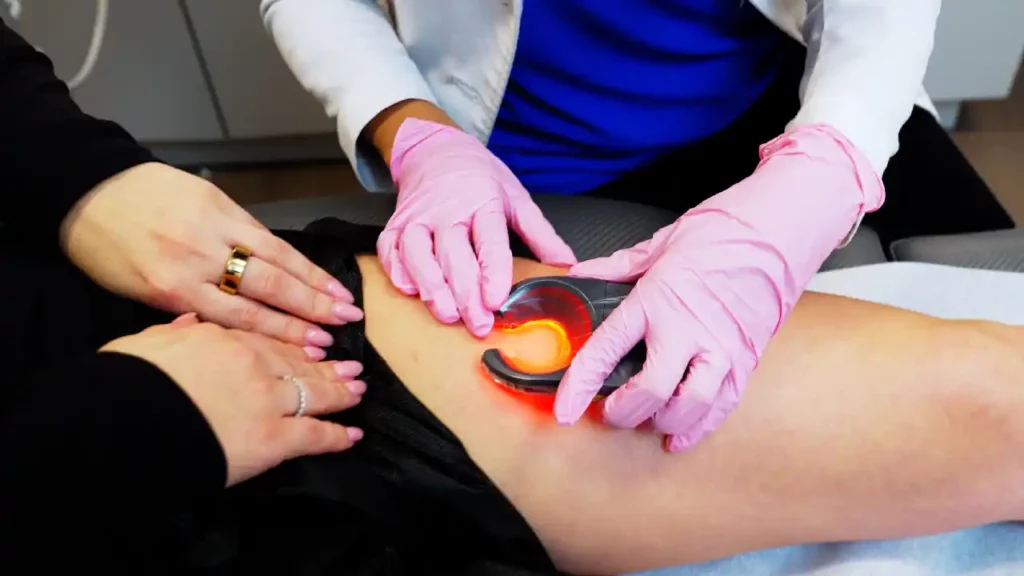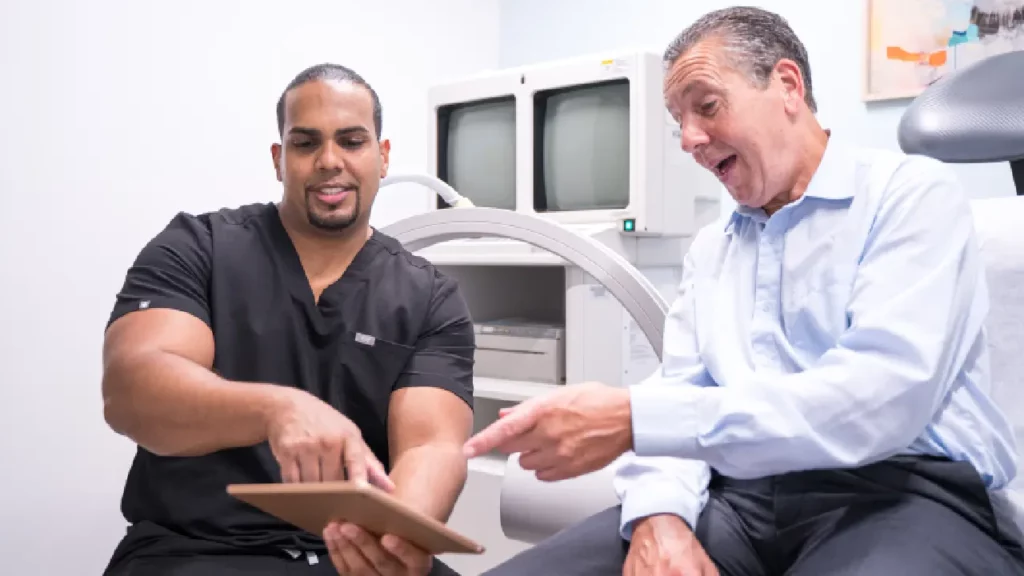Managing Weight for Improved Venous Health: The Weight-Vein Connection
Are you concerned about your venous health? Have you ever wondered how your weight can impact the health of your veins? In this article, we explore the intricate relationship between managing your weight and achieving improved venous health. We highlight the reasons why excess weight can be detrimental to your veins, the various venous conditions associated with obesity, and, most importantly, practical steps you can take to maintain a healthy weight and promote optimal vascular well-being.
The Importance of Venous Health
Your veins play a vital role in your circulatory system, responsible for returning deoxygenated blood from various parts of your body back to the heart. Healthy veins ensure smooth blood flow, preventing blood from pooling and forming clots. The veins in the legs must carry blood up to the heart, flowing against the force of gravity. This is facilitated through the vein valves, one-way structures that allow blood to flow toward the heart but not backward due to gravity.
When the vein valves malfunction or weaken, blood flows backward due to gravity and accumulates in the leg veins. The continued accumulation of blood in leg veins can lead to chronic venous insufficiency and its associated symptoms, including varicose veins, spider veins, leg pain, leg swelling, leg heaviness, restless leg syndrome, leg ulcers, and deep vein thrombosis. As such, maintaining proper venous function is essential for overall well-being.
Are you interested in getting more information about your condition or a treatment?
Fill the form below to start!
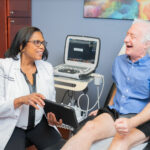

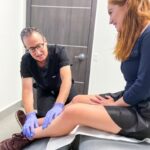
The Weight-Vein Connection: How Excess Weight Impacts Your Veins
Excess weight, especially obesity, can exert significant stress on your venous system. Let’s explore some of the key ways in which being overweight can negatively affect your veins.
Increased Pressure on Veins
Carrying excess weight places additional pressure on the veins in your legs, where gravity makes it even more challenging for blood to flow back to your heart. As you gain weight, your veins may struggle to pump blood efficiently, leading to venous insufficiency, a condition where the veins have difficulty returning blood to the heart.
Weakened Vein Walls
Obesity can weaken the walls of your veins over time. This weakening can result from chronic inflammation caused by excess fat tissue, making your veins more susceptible to damage. Weaker vein walls are less effective in preventing blood from flowing backward, increasing the risk of conditions like varicose veins and spider veins.
Increased Risk of Blood Clots
Obesity is a known risk factor for deep vein thrombosis, where blood clots form in the deep veins of the legs. The excess weight can promote the development of blood clots due to decreased blood flow, especially in the lower extremities. These clots can break loose and travel to the lungs, causing a life-threatening condition known as pulmonary embolism.
Venous Conditions Associated with Obesity
Now that we’ve established the impact of excess weight on your veins let’s take a closer look at some of the venous conditions that are commonly associated with obesity.
Varicose Veins
Varicose veins are enlarged, twisted veins that often appear on the legs and can be painful and unsightly. Obesity increases the risk of developing varicose veins due to the added pressure on the veins in the lower extremities. These veins can become weakened and inefficient at returning blood to the heart, resulting in the characteristic bulging and twisting.
Spider Veins
Spider veins are smaller than varicose veins and are often red, blue, or purple in appearance. They tend to occur closer to the surface of the skin and are commonly seen on the legs. Obesity can contribute to the development of spider veins, as excess weight can hinder blood flow and weaken the tiny blood vessels near the skin’s surface.
Chronic Venous Insufficiency (CVI)
Chronic venous insufficiency is a condition where the veins struggle to return blood to the heart, causing symptoms such as swelling, pain, and skin changes in the affected area. Obesity is a risk factor for CVI, as the increased pressure on the veins can lead to valve dysfunction, making it harder for blood to flow upward against gravity.
Deep Vein Thrombosis (DVT)
As mentioned earlier, obesity is a significant risk factor for DVT. This condition occurs when blood clots form in the deep veins of the legs, and it can lead to serious complications if left untreated. Obesity contributes to DVT by both increasing pressure on the veins and promoting a pro-inflammatory state that encourages clot formation.
Practical Steps for Managing Weight and Improving Venous Health
Now that we understand the weight-vein connection and the potential risks associated with excess weight let’s explore some practical steps you can take to manage your weight and promote optimal venous health:
- Maintain a Balanced Diet: A healthy diet is the cornerstone of weight management and venous health. Focus on a diet rich in fruits, vegetables, lean proteins, and whole grains while limiting your intake of processed foods, sugary beverages, and high-fat meals. This can help you achieve and maintain a healthy weight and reduce inflammation in your body.
- Regular Exercise: Physical activity plays a crucial role in managing weight and improving venous health. Aim for at least 150 minutes of moderate-intensity aerobic exercise or 75 minutes of vigorous-intensity aerobic exercise each week. Exercise helps increase blood flow, strengthen your veins, and promote overall cardiovascular health.
- Stay Hydrated: Proper hydration is essential for venous health. Drinking an adequate amount of water helps maintain blood viscosity, making it easier for your veins to pump blood back to the heart. Aim to drink at least eight glasses of water a day and avoid excessive alcohol consumption, which can lead to dehydration.
- Lose Weight Gradually: If you need to lose weight, it’s important to do so gradually. Rapid weight loss can put added stress on your veins and increase the risk of weight regain. Slow and steady weight loss is safer and more sustainable.
- Elevate Your Legs: If you spend long periods sitting or standing, consider elevating your legs whenever possible. This helps reduce the pressure on your leg veins and promotes better blood flow. Additionally, taking short breaks to walk or stretch can be beneficial.
- Wear Compression Stockings: Compression stockings are designed to improve blood flow in the legs by applying gentle pressure to the veins. These can be particularly helpful if you have venous issues or spend a lot of time on your feet. Consult with a vein doctor to determine the appropriate compression level and fit for your needs.
Weight Is Not the Only Risk Factor for Vein Conditions
While excess weight is undeniably a significant risk factor for various venous conditions, it’s essential to recognize that weight alone is not the sole contributor to these issues. Venous health is influenced by a combination of factors, including:
- Age: As we age, the risk of developing venous conditions increases. The natural wear and tear on vein valves over time can lead to venous insufficiency, varicose veins, and other vascular problems. While you can’t control your age, you can focus on adopting a healthy lifestyle and preventive measures to mitigate the impact of aging on your venous health.
- Family History: Genetics can play a crucial role in determining your susceptibility to venous issues. If your parents or close relatives have had venous conditions, you may have a higher likelihood of developing them as well. Being aware of your family history can prompt you to be more proactive in monitoring and managing your venous health.
- Gender: Certain venous conditions, such as varicose veins, are more common in women than in men. Hormonal changes, especially during pregnancy and menopause, can contribute to the development of varicose veins.
- Prolonged Sitting or Standing: Occupations or lifestyles that involve prolonged periods of sitting or standing can increase the risk of venous conditions. When you remain in one position, blood flow in the legs can become sluggish, leading to poor circulation and potential vein problems. Taking regular breaks to move around can help alleviate this risk.
- Previous Vein Conditions: If you’ve had venous conditions in the past, you may be at a higher risk of recurrence or developing other vein-related problems. It’s essential to follow your vein doctor’s recommendations for ongoing care to minimize the risk.
Consult Our Vein Doctors
There is a clear and intricate connection between managing your weight and achieving improved venous health. Excess weight can exert significant stress on your veins, leading to various venous conditions and increasing the risk of complications like deep vein thrombosis. However, by adopting a healthy lifestyle that includes a balanced diet, regular exercise, proper hydration, and other preventive measures, you can mitigate these risks.
Remember that your venous health is not just a cosmetic concern; it affects your overall quality of life and can have serious health implications. Take proactive steps to manage your weight and promote healthy veins, and if you have any concerns or existing venous conditions, don’t hesitate to schedule a consultation with our board-certified vein doctors. Our vein clinics in New York, New Jersey, California, and Maryland are led by vein doctors committed to helping you achieve and maintain optimal vascular health.





